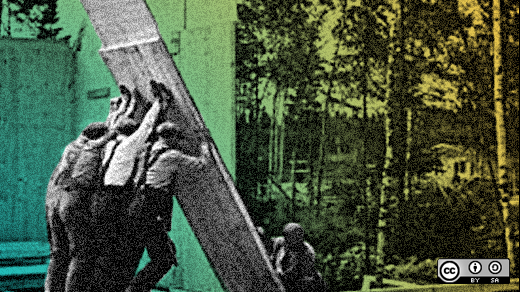I have told the story of how FinTP, the first open source application for processing financial transactions, was born. Here, I would like to present a deeper view on how the community is being built, its structure and governance and why I think people should join such communities. I myself am a founding member of two communities, the first being built together with my friends after our first bachelor party, from a desire to preserve our spirit of joy and good vibes. The second one is the open source community around FinTP, called FINkers United.
An open source project cannot succeed without a powerful community that supports its development. At the same time, Eric Raymond said in The Cathedral and the Bazaar that a necessary pre-condition for success in an open source project is having something runnable and testable to play with. Therefore we have the chicken and egg dilemma of which comes first—the product or the community. Fortunately, FinTP had both, being the result of evolution from its previous commercial version to open source and having a company, partners’ network and a user base that would become the starting point for the open community FINkers United.
While it may seem that the transition from the closed community to FINkers United is destined to be smooth, there are many adjustments to be made. The roles in the community have to change drastically, from the former way of interaction between supply and demand sides, in order to benefit from all the advantages an open environment has to offer—reduced time-to-market, better results delivered from a strong collaboration, cost savings. Of course, a coherent governance strategy has to be established so the project doesn’t go off rails.
Community structure
Communities are groups of individuals sharing common interests. FINkers United is not different, all members having the same goal to improve the processing of financial transactions based on open source applications, pushing the interoperability level in order to achieve a new semantic standardization for financial transactions. For this specific community and mission, several professional profiles of individuals and institutions are welcomed: technical (developers, IT architects and designers, implementers, support, quality assurance), business (business knowledge in banking practice, standards, financial transaction processing, banking or corporate treasury, corporate to bank business etc.), communication, marketing, market analysts, auditing and legal consultants.
In order to successfully establish the strategy and objectives, to manage and control the activity of the community, the community we conceived has the following three governing entities: General Assembly, Board of Directors and Censor. In the early stages of the community, the governance is ensured by the founding company, since it is the sole contributor. For now, the community has a Technical Committee coordinated by the company’s CTO, which includes 10 project leaders. In time, new hierarchies will emerge based on merit and contributions, so any member can be elected.
Reasons to join the FINkers United community
The most common question is what’s in it for me, why should I join this community?
The rewards are very different from the traditional closed-source projects, where there is a clear limit. For suppliers, the types of reward-earning contributions are in the job description, for which you get a monthly paycheck. For the demand side, what you pay is what you get, with limited flexibility from both providers and budget owners.
In open source communities, the benefits are different for every member profile, but the essence is that everybody is involved because of having a shared interest and acts as an entrepreneur—having ideas, initiatives and the freedom to act accordingly to own beliefs.
For the adopters, the benefits of using and supporting open source software have been debated in length, and they include:
- The power to influence projects and strategies
- Freedom from vendor locking
- Benefit from better, more secure and reliable products
- Better TCO and time to market
- Reduce development and maintenance cost
- Attract and retain development talent
- Community based, price affordable, service consistent, guaranteed quality 'escrow agent'
For contributors, the satisfactions are mostly triggered by a sense of accomplishment.
- Material—custom professional services can be offered to adopters who lack certain skills or need SLAs
- Intellectual—there’s great opportunity to develop the professional profile by taking on the technical challenges open source projects have to offer
- Recognition—open source communities reward each of their members based on the value of their contributions
- Competitive—the opportunity to work for state of the art technological projects, with high impact on several industries
Speaking for myself, my motivation for joining FINkers United is that being a part of the team that attempts to revolutionize the financial transactions processing arena is a great challenge and experience, not to mention that succeeding would be truly an accomplishment. Moreover, I believe that creativity is original thinking based on openly sharing knowledge and transparently sharing results.
Why would you join an open source community?
View the complete collection of Beginners in Open Source Week articles.








Comments are closed.